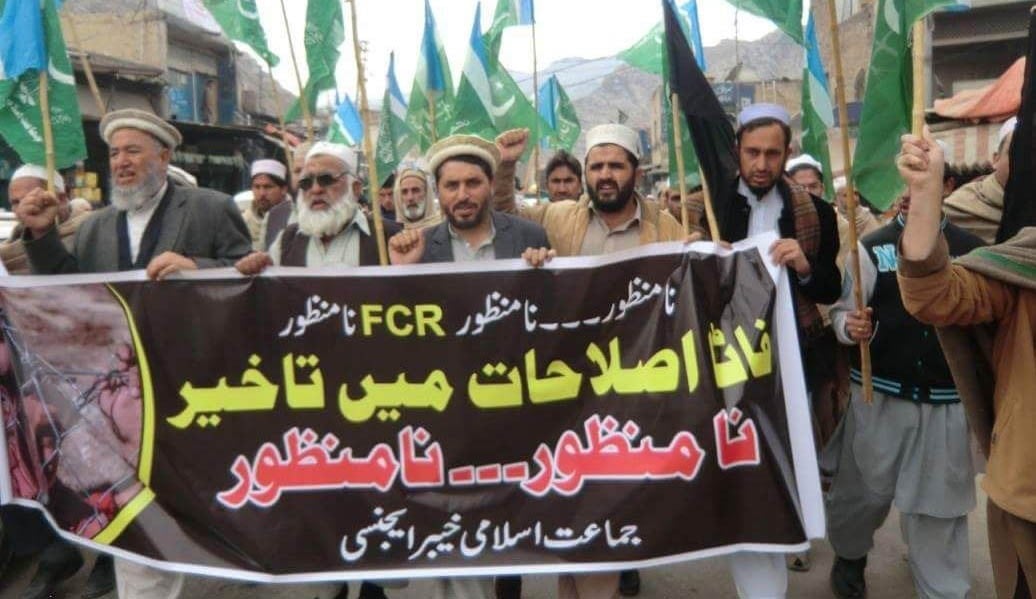
The dreams and aspirations of Fata’s people for a peaceful future must be addressed urgently

The fate of the proposed reforms in Federally Administered Tribal Areas (Fata) seems to be in the doldrums again as the prime minister has reportedly ordered the Riwaj Act to be held back till further orders. According to media reports, the prime minister was forced to halt the reform process after JUI-F chief Maulana Fazlur Rehman showed strong opposition outweighing the demands of other tribal lawmakers who want the merger process to be expedited.
At the dawn of a nation’s independence, every individual dreams of a bright and peaceful future which will provide education, healthcare, social infrastructure and a harmonious life. However, since the inception of Pakistan, the provision of these facilities to citizens of the country was not adequately materialised.
Even during the subcontinent’s British Raj, Central India was failing to serve this phenomenon. The northwest part of India did not hold a good record in the field of education and health. Only a few missionary institutions were established to provide relief to the masses. The British had their own objectives regarding the occupation of India and after partition Pakistan was left with the same administrative structure that it experienced during the British Raj.
Small internally autonomous states like Swat, Dir, Chitral, Bahawalpur, Amb and Kalaat continued to be a part of Pakistan and with the passage of time they were merged into the mainstream administrative structure of Pakistan, but nothing was concluded regarding the fate of the tribal belt. It was the duty and moral obligation of the first legislative assembly of Pakistan to decide the fate of the tribal belt.
Fata is a semi-autonomous tribal region in northwestern Pakistan, bordering Pakistan’s provinces of Khyber Pakhtunkhwa (KPK) and Balochistan to the east and south, and Afghanistan’s provinces of Kunar, Nangarhar, Paktia, Khost and Paktika to the west and north. It consists of seven tribal agencies i.e. Khyber, Kurram, Mohmand, Bajaur, Orakzai, North and South Waziristan. Besides these 7 agencies, it also comprises a few frontier regions, including, FR Peshawar, FR Kohat, FR Bannu etc.
The Durand Line is the 2,430-kilometre international border between Pakistan and Afghanistan which was established in 1896 by Sir Mortimer Durand, a British diplomat and Abdur Rahman Khan, the Afghan Amir, to fix the limit of their respective spheres of influence. To the east of the Durand Line lies Pakistan’s Fata.
Under the 1973 Constitution, Pakistan was declared a federation having four administrative/federating units but once again the fate of Fata was left ambiguous.
If we look into the current situation of Fata, it still reflects the picture of 12th century social structure. It depicts a bleak picture of deprivation, undernourishment and negligence.
Since independence, Fata’s political system has kept its status quo in the area and the basic concept of human rights was neither introduced nor exercised. The lives of each and every inhabitant of Fata have been at the mercy of the Frontier Crime Regulations (FCR).
Currently Fata lacks health, education and organised infrastructure and this stimulates deprivation that’s resultantly exploited by the anti-state forces who establish their hideouts and safe havens there. It is high time to address the wounds of Fata and to bring the tribal belt in the mainstream structure of Pakistan because this is not a piece of strange land but an integral part of Pakistan.
It is tragic that for the past 70 years, our Fata brothers and sisters did not have university in their cities and towns. Recently, a ‘Fata University’ has been announced and one hopes that this university flourishes and meets the standards of other universities in the country.
The British laid down a railway track from Peshawar to Landi Kotal and instead of utilising it as a source of trade and communication this track has become redundant over the years. This reflects the height of our inefficiency.
Recently, the federal cabinet has approved Fata reforms and has announced a vague schedule regarding the merger of Fata with KPK. The KPK Assembly, Fata parliamentarians and elders are desperate for this merger but the anomaly is that the federal government is more focused on Panama papers and Dawn Leaks rather than addressing this more important issue of the merger of Fata with KPK.
The patriotism of Fata’s people is above question and their aspirations and dreams for a bright future must be urgently addressed. The people of Fata and the masses in KPK have one religion, one ethnic background, one culture; and this merger will strengthen the country.